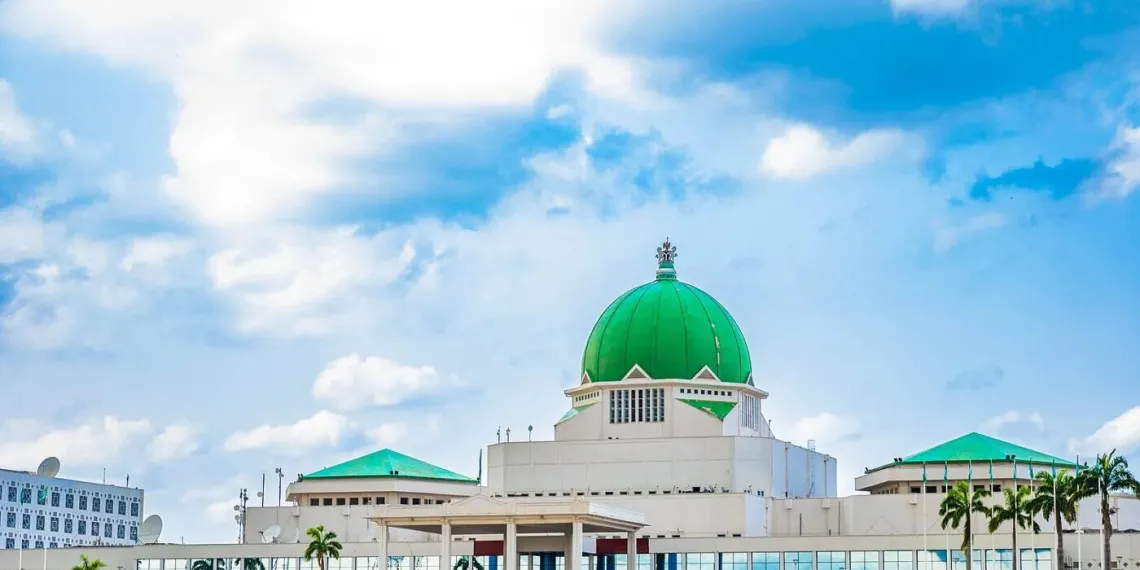Despite women comprising nearly 50 per cent of the population and over 43 per cent of registered voters, their legislative presence remains minimal.
In Nigeria, where women comprise almost half the population but remain largely invisible in decision-making, a new constitutional amendment bill has re-ignited debates about gender equity in governance.
Titled, “A bill for an act to alter the provisions of the Constitution of the Federal Republic of Nigeria, 1999, to provide for seat reservation for women in the National and State Houses of Assembly; and for related matters,” the proposed legislation is one of the most ambitious attempts yet to correct the imbalance in women’s political representation.
It is jointly sponsored by Benjamin Kalu, the deputy speaker of the House of Representatives, and 12 others. They include Tolani Shagaya, Mohammed Hassan, the late Oriyomi Onanuga, Blessing Onuh, Joshua Gana, Kama Nkemkanma, and Chinwe Nnabuife.


Other co-sponsors are Amobi Godwin, Khadija Ibrahim, Jonathan Gbefwi, Jafaru Leko, and Francis Waive.
The proposed changes would amend critical sections of the Nigerian Constitution, particularly Sections 48, 49, and 91, to guarantee women’s participation across all legislative levels.
For many women in Africa’s most populous country, the bill is an effort to restore balance in a country where women make up less than five per cent of the country’s lawmakers.
What the bill proposes
In the 109-member Senate, each of Nigeria’s 36 states and the Federal Capital Territory (FCT) would have an additional senatorial seat reserved explicitly for women. This means 37 women would be added to the chamber, effectively increasing the total number of senators to 146.
The House of Representatives would also have an additional seat for each state and the FCT to be occupied by women, translating to 37 more women in the new 397-member chamber.
At the subnational level, state assemblies would also have a special seat reserved for women from each of the three senatorial districts, ensuring that women are represented in the political structures closest to citizens.
The bill explicitly states that women can contest other constituency seats under the current electoral arrangements. The reserved seats are to guarantee women more seats in parliament.
A temporary corrective measure
One of the most debated aspects of the bill is its 16-year lifespan clause. The special seats, if created, would take effect in the next national and state assemblies and would be subject to a review after four general election cycles.
This means lawmakers will decide whether to retain, expand, or abolish the policy in 16 years. The bill’s drafters argue that this safeguard ensures the measure is not seen as a distortion of Nigeria’s democracy but as a temporary corrective mechanism to level the gender playing field.
The idea is that after four cycles, barriers such as political gatekeeping, the financial cost of campaigns, and cultural biases might have been eased, allowing women to compete more equitably without special interventions.
Why this matters
Nigeria’s legislative chambers are numerically lopsided against women.
Women comprise nearly 50 per cent of the population and over 43 per cent of registered voters, but they have lower representation in the legislative houses.
Wuraola Esan, a women’s rights activist, educator, and nationalist, became the first woman member of the Nigerian Senate in 1960 in the First Republic after the Western Region government appointed her under the Action Group party. Franca Afegbua became the first elected female senator when she won the Bendel North seat in 1983 in the Second Republic. However, progress has been painfully slow since those pioneers paved the way for women in politics. Four decades later, women have remained nearly invisible in Nigeria’s legislative process. Persistent barriers, cultural bias, campaign finance constraints, and political gatekeeping impede progress.

At the beginning of the Fourth Republic (1999–2003), there were 15 women in the 469-member National Assembly—three in the Senate and 12 in the House—representing about 3.2 per cent.
Representation has consistently stayed low across subsequent assemblies, according to data compiled by the Inter-Parliamentary Union (IPU) and National Institute for Legislative and Democratic Studies (NILDS).
- 5th Assembly (2003–2007): about 27 women
6th Assembly (2007–2011): 34 women (7.2 per cent) - 7th Assembly (2011–2015): 26 women (5.5 per cent)
- 8th Assembly (2015–2019): 23 women (5 per cent)
- 9th Assembly (2019–2023): 21 women (4.5 per cent)
10th Assembly (2023–2027): 18 women (4 senators & 16 representatives), about 3.83 per cent.
The picture is not brighter at the state level. At the 2023 elections, only 48 women were elected from 21 of Nigeria’s 36 state assemblies—fewer than five per cent of about 1,019 female candidates and nearly 990 seats—Anambra, Kaduna, Bayelsa, Benue, Cross River, Delta, Ekiti, Oyo, Taraba, Nasarawa, Plateau, Kogi, Kwara, Akwa Ibom, Ogun, Lagos, Adamawa, Ondo, Enugu, and Ebonyi.
Women failed to secure seats in 13 states. Bauchi, Borno, Gombe, Imo, Jigawa, Kano, Katsina, Kebbi, Abia, Osun, Sokoto, Yobe, and Zamfara returned no women.
A regional breakdown reveals sharp disparities. The South-west produced the highest number with 16 female lawmakers across five states. Ekiti led with six, Lagos and Ondo followed with three each, while Ogun and Oyo produced two apiece. Osun, however, elected none.
The North-central region elected 12 female lawmakers in five of the six states. Kwara topped the list with five, Benue, Plateau, and Kogi each produced two, and Nasarawa produced one.
In the South-south, 10 women were elected across five states. Akwa Ibom led with four, Bayelsa and Delta returned two each, while Cross River and Edo produced one each.
The South-east recorded five women across three states: Ebonyi and Enugu had two each, and Anambra had one. Abia and Imo produced none.
The North-east accounted for only three women from two states. Taraba produced two, and Adamawa one, while Bauchi, Borno, Gombe, and Yobe had no female lawmakers.
Only Kaduna managed to elect two women in the North-west. The six other states—Kano, Zamfara, Jigawa, Sokoto, Katsina, and Kebbi—returned no female representatives.
These representation figures fall drastically short of the 30 per cent benchmark agreed at the 1995 Fourth World Conference on Women in Beijing, China, where nations adopted the Beijing Platform for Action as a global roadmap for gender equality.
Meanwhile, Rwanda has become a global reference point, with women holding 61 per cent of seats in its parliament. Senegal and South Africa also boast figures above 40 per cent, reflecting deliberate efforts to break structural barriers.
The new bill, if passed, would raise Nigeria’s female representation to 20 per cent at the federal level, a significant leap even if still short of the United Nations recommended 35 per cent affirmative action threshold.
The birth of “special constituency”
Perhaps the bill’s most innovative feature is the concept of “special constituencies.” These would be electoral districts carved out specifically for women.
In practical terms, this would mean each state functioning as a single women’s constituency in the House of Representatives, each senatorial district producing a woman representative at the state level, and an entirely new senatorial seat dedicated to women in the Senate.
By design, the model goes beyond tokenism or executive appointments, embedding women’s inclusion in the electoral system. It also guarantees legitimacy, since women would have to emerge through competitive elections, albeit within women-only constituencies.
A history of failed attempts
This is not the first time Nigeria has debated gender-focused constitutional amendments.
In 2022, the House of Representatives rejected five gender-related bills, one of which sought to create reserved seats for women. Others included proposals to grant citizenship to foreign-born husbands of Nigerian women and allocate 35 per cent of political appointments to women.
The rejection triggered widespread protests, with women’s groups and civil society barricading the National Assembly gates in frustration. Though the then-leadership promised to revisit the bills, they were never reconsidered before the Assembly wound up.
The new Reserved Seats Bill, however, is different in scope and strategy. With Mr Kalu as the lead sponsor and clear provisions for review, it is believed to have a stronger chance of passing. The deputy speaker chairs the House Committee on the Review of the Constitution.
The Speaker of the House of Representatives, Abbas Tajudeen, and Senate President Godswill Akpabio have also spoken in support of the bill in the past, an indication that the bill is likely to be approved by the parliament.
![The Speaker of the 10th Assembly, Tajudeen Abbas. [PHOTO CREDIT: House of Representatives, Federal Republic of Nigeria]](https://i0.wp.com/media.premiumtimesng.com/wp-content/files/2024/06/426459548_843690957790254_2608299855068340132_n.jpg?resize=1280%2C912&ssl=1)
“I am proud to say that this House has prioritised inclusivity in our legislative agenda. I have directed the Constitutional Review Committee to focus on reforms that promote gender equity and provide additional or reserved seats for women in our legislative bodies,” Mr Tajudeen said last October, while Mr Akpabio described the bill as “an idea whose time has come.”
The inclusion of the bill in the legislative agenda of the House of Representatives also signals that the leadership views it as a priority reform.
If passed, it could mark the most transformative constitutional change for women in Nigerian politics since 1999. If rejected, it risks deepening the perception that Nigeria’s democracy remains male-dominated and structurally exclusionary.
Either way, the debate around it will force Nigeria to confront one of its most glaring contradictions: that half the population remains nearly invisible in the chambers where laws about their lives are made.
Advocates Welcome Bill
Many gender advocates across Nigeria have declared support for the bill and called on lawmakers to ensure its passage.
Ololade Ajayi, founder of the advocacy group Document Our History (DOHS Cares), described the bill as “a welcome development,” but warned that Nigeria’s entrenched political culture may frustrate its passage and implementation.
“Without deliberate interventions, it would take another 30 years for women to bridge the gap in political participation,” she told PREMIUM TIMES.
Osasu Ogwuche of TOS Foundation said, “This is not just a gender bill; this is a sovereignty bill. We’re not adding seats. We’re restoring balance.”
Stay ahead with the latest updates!
Join The Podium Media on WhatsApp for real-time news alerts, breaking stories, and exclusive content delivered straight to your phone. Don’t miss a headline — subscribe now!
Chat with Us on WhatsApp








